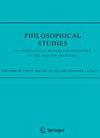更新他人的证据
IF 1.1
1区 哲学
0 PHILOSOPHY
引用次数: 0
摘要
人们往往只知道别人的观点,却不知道其背后的证据。在这种情况下,您应该如何修正自己的观点呢?迪特里希(Dietrich,2010 年)指出,对于有关客观偶然性的观点,称为 upco 的方法可以有效地将对话者的证据添加到自己的观点中。我们提供了一种简单的方法来看待 upco,这种方法能让迪特里希这样的特性变得容易理解,我们用它做了三件事。首先,我们将迪特里希的upco动机与埃斯瓦兰等人(2016)的另一个动机统一起来。其次,我们证明了外行人有时可以利用 upco 来解决专家的分歧。第三,我们用它来厘清独特性论题的社会论证。本文章由计算机程序翻译,如有差异,请以英文原文为准。

Updating on the evidence of others
One often learns the opinions of others without getting to hear the evidence behind them. How should you revise your own opinions in such cases? Dietrich (2010) shows that, for opinions about objective chance, the method known as upco effectively adds your interlocutor’s evidence to your own. We provide a simple way of viewing upco that makes properties like Dietrich’s easy to appreciate, and we do three things with it. First, we unify Dietrich’s motivation for upco with another motivation due to Easwaran et al. (2016). Second, we show that laypeople can sometimes use upco to resolve expert disagreements. And third, we use it to cricitize the social argument for the uniqueness thesis.
求助全文
通过发布文献求助,成功后即可免费获取论文全文。
去求助
来源期刊

PHILOSOPHICAL STUDIES
PHILOSOPHY-
CiteScore
2.60
自引率
7.70%
发文量
127
期刊介绍:
Philosophical Studies was founded in 1950 by Herbert Feigl and Wilfrid Sellars to provide a periodical dedicated to work in analytic philosophy. The journal remains devoted to the publication of papers in exclusively analytic philosophy. Papers applying formal techniques to philosophical problems are welcome. The principal aim is to publish articles that are models of clarity and precision in dealing with significant philosophical issues. It is intended that readers of the journal will be kept abreast of the central issues and problems of contemporary analytic philosophy.
Double-blind review procedure
The journal follows a double-blind reviewing procedure. Authors are therefore requested to place their name and affiliation on a separate page. Self-identifying citations and references in the article text should either be avoided or left blank when manuscripts are first submitted. Authors are responsible for reinserting self-identifying citations and references when manuscripts are prepared for final submission.
 求助内容:
求助内容: 应助结果提醒方式:
应助结果提醒方式:


